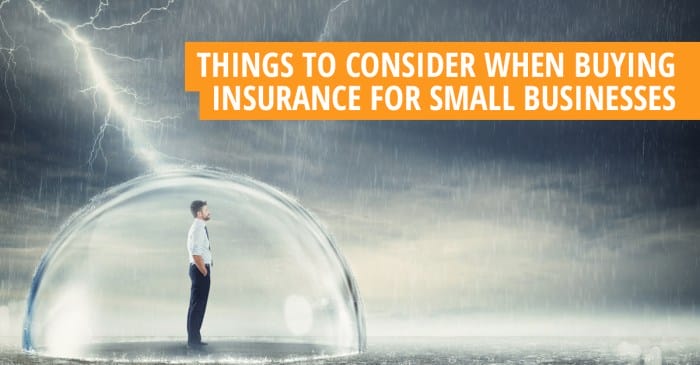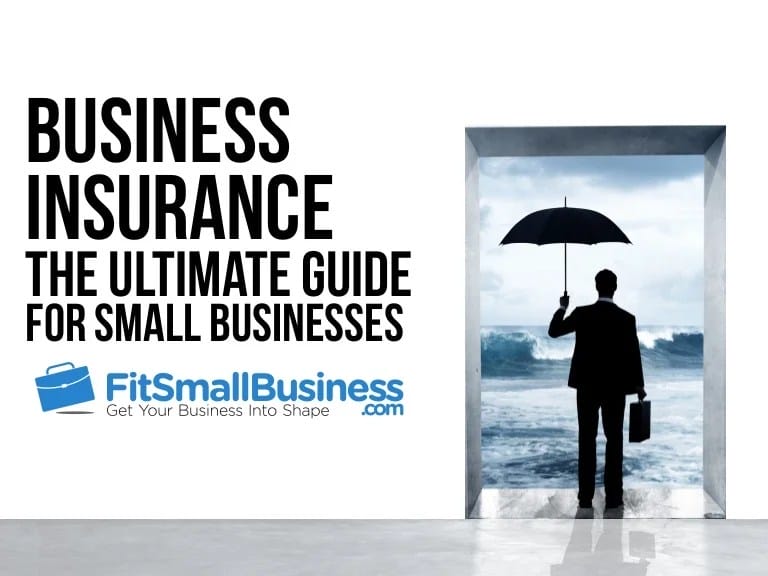In the ever-evolving world of small business ownership, navigating the insurance landscape can be a daunting task. With a plethora of insurance options available, it’s crucial to understand the intricacies of each policy to ensure comprehensive protection for your enterprise.
This guide will equip you with expert tips to help you make informed decisions when purchasing insurance for your small business.
From understanding the various types of insurance available to selecting the right insurance company, we’ll cover it all. By delving into the specifics of liability, property, business interruption, workers’ compensation, health, commercial auto, cyber, and umbrella insurance, you’ll gain a comprehensive understanding of the insurance landscape.
Let’s dive in and explore the strategies that will safeguard your business and ensure its continued success.
Business Insurance Types

Navigating the world of business insurance can be daunting, but understanding the various types of coverage available is crucial for small business owners. Choosing the right policies can protect your company from financial losses and liabilities, ensuring its long-term success.
There are numerous types of business insurance, each designed to address specific risks and exposures. Some common types include:
Liability Insurance
- Protects your business against claims of bodily injury or property damage caused by your products, services, or operations.
- Examples include general liability insurance, product liability insurance, and professional liability insurance.
Property Insurance
- Covers physical assets like buildings, equipment, and inventory against damage or loss due to events like fire, theft, or natural disasters.
- Examples include commercial property insurance and business interruption insurance.
Business Income Insurance
- Provides financial support to cover lost income and expenses if your business is forced to close temporarily due to covered events like fire or natural disasters.
Workers’ Compensation Insurance
- Protects employers from financial liability for work-related injuries or illnesses suffered by employees.
- Required in most states and provides benefits like medical care, lost wages, and disability payments.
Cyber Insurance
- Covers financial losses and expenses resulting from cyberattacks, data breaches, or technology failures.
- Includes coverage for data recovery, legal expenses, and business interruption.
Tailoring Insurance Policies to Your Business
Choosing the right insurance policies is essential, but it’s equally important to tailor them to your specific business needs. Consider factors like your industry, location, size, and potential risks. An insurance professional can help you assess your risks and create a customized insurance plan that provides comprehensive protection.
Liability Insurance

Liability insurance is a type of business insurance that protects the business and its owners from financial losses resulting from legal claims made by third parties.
It is designed to cover the costs associated with defending against lawsuits, as well as any damages or settlements that may be awarded to the claimant.
Common Liability Insurance Policies
There are several common types of liability insurance policies available to small business owners:
- General Liability Insurance: Covers claims related to bodily injury, property damage, and advertising injuries.
- Product Liability Insurance: Protects against claims alleging that a product sold by the business caused injury or damage.
- Professional Liability Insurance: Also known as errors and omissions (E&O) insurance, this policy covers claims alleging that the business made a mistake or failed to perform a service as promised.
- Directors and Officers (D&O) Insurance: Protects the personal assets of company directors and officers from claims alleging mismanagement or breach of fiduciary duty.
Factors Influencing Liability Insurance Premiums
The cost of liability insurance premiums is determined by several factors, including:
- Type of Business: Some businesses are considered higher risk than others, and thus may pay higher premiums.
- Claims History: Businesses with a history of claims are likely to pay higher premiums.
- Policy Limits: The higher the policy limits, the higher the premium.
- Deductible: The higher the deductible, the lower the premium.
- Business Location: The location of the business can also affect the premium.
Property Insurance

Property insurance provides coverage for a business’s physical assets, such as buildings, equipment, and inventory. It protects against losses resulting from fire, theft, vandalism, and other covered perils.Different types of property insurance policies include:
- Building insurance: Covers the physical structure of the business, including the roof, walls, floors, and windows.
- Equipment insurance: Covers business equipment, such as computers, machinery, and tools.
- Inventory insurance: Covers the business’s stock of goods, both raw materials and finished products.
- Business interruption insurance: Covers the loss of income and other expenses that a business incurs as a result of a covered property loss.
The factors that determine property insurance premiums include:
- The type of business.
- The location of the business.
- The construction of the business’s building.
- The value of the business’s property.
- The business’s claims history.
Business Interruption Insurance

Business interruption insurance is a type of insurance that helps protect a business from financial losses incurred during disruptions to its operations. It covers lost income and other expenses that result from an interruption in business activities due to covered events such as natural disasters, fires, or equipment failures.
Business interruption insurance can help a business recover from an interruption by providing financial assistance to cover lost income, ongoing expenses, and extra expenses incurred during the interruption. It can also help cover the cost of relocating the business to a temporary location or rebuilding the business if it is destroyed.
Factors Affecting Business Interruption Insurance Premiums
The cost of business interruption insurance premiums can vary depending on several factors, including:
- The type of business: Some businesses are more likely to experience interruptions than others. For example, a business that relies on a single supplier or a business located in an area prone to natural disasters may have higher premiums.
- The size of the business: Larger businesses typically have higher premiums than smaller businesses because they have more employees and more assets to protect.
- The amount of coverage: The amount of coverage a business needs will affect the cost of its premiums. Businesses that need more coverage will typically pay higher premiums.
- The deductible: The deductible is the amount of money a business must pay out of pocket before the insurance company starts to cover losses. A higher deductible will typically result in lower premiums.
Workers’ Compensation Insurance
For small business owners, workers’ compensation insurance serves as a crucial safety net, safeguarding both the well-being of employees and the financial stability of the company. This insurance protects businesses from potential liabilities arising from work-related injuries, illnesses, or disabilities sustained by their employees.
Common workers’ compensation insurance policies typically cover medical expenses, lost wages, and rehabilitation costs associated with work-related incidents. These policies can also provide benefits for permanent disabilities or death resulting from work-related causes.
Factors Influencing Premiums
Several factors influence the premiums for workers’ compensation insurance, including:
- Industry Type: Certain industries, such as construction or manufacturing, pose higher risks of work-related accidents and thus command higher premiums.
- Payroll: The total amount of wages paid to employees is a key factor in determining the premium. Higher payroll generally leads to higher premiums.
- Claims History: Businesses with a history of frequent or severe workers’ compensation claims may face higher premiums.
- Workplace Safety: Companies with robust safety programs and a low incidence of accidents may qualify for lower premiums.
- State Regulations: Workers’ compensation laws and regulations vary by state, impacting the cost of insurance.
Health Insurance for Employees
Offering health insurance to employees is not only a legal requirement in many jurisdictions, but also a valuable benefit that can attract and retain top talent. Providing health insurance demonstrates that a business cares about the well-being of its employees and their families, boosting morale and fostering a positive work environment.
Types of Health Insurance Plans for Small Businesses
There are several types of health insurance plans available for small businesses, each with its own advantages and disadvantages. The most common types include:
- Group Health Insurance: This type of plan is designed specifically for small businesses and offers a variety of coverage options. It is often more affordable than individual health insurance plans and allows businesses to pool their risks, resulting in lower premiums.
- Health Maintenance Organizations (HMOs): HMOs offer comprehensive health coverage at a fixed monthly premium. They require members to choose a primary care physician (PCP) who coordinates their care and refers them to specialists as needed. HMOs typically have lower premiums than other types of health insurance plans, but they may also have more restrictions on the choice of providers and services.
- Preferred Provider Organizations (PPOs): PPOs offer more flexibility than HMOs. They allow members to choose any provider they want, but they may have higher premiums and deductibles. PPOs also typically offer a wider range of covered services than HMOs.
- Exclusive Provider Organizations (EPOs): EPOs are similar to HMOs, but they offer a narrower network of providers. This can result in lower premiums, but it also means that members have fewer choices when it comes to choosing a doctor or hospital.
- Point-of-Service (POS) Plans: POS plans combine features of both HMOs and PPOs. They allow members to choose a PCP within the plan’s network, but they also allow them to see out-of-network providers at a higher cost.
Factors Affecting Health Insurance Premiums for Small Businesses
The cost of health insurance premiums for small businesses is determined by a number of factors, including:
- Number of Employees: The more employees a business has, the higher its premiums will be.
- Employee Demographics: The age, gender, and health status of employees can also affect premiums. Businesses with older or sicker employees will typically pay higher premiums.
- Plan Design: The type of health insurance plan a business chooses will also affect its premiums. Plans with more comprehensive coverage and lower deductibles will typically have higher premiums.
- Location: The cost of health insurance can also vary depending on the location of the business. Premiums are typically higher in urban areas than in rural areas.
Commercial Auto Insurance

Commercial auto insurance is a type of insurance that protects businesses from financial losses resulting from accidents involving vehicles used for business purposes. It covers a wide range of vehicles, including cars, trucks, vans, and buses.
Commercial auto insurance policies typically include the following types of coverage:
- Liability coverage: This coverage pays for bodily injury and property damage caused to others by a covered vehicle.
- Collision coverage: This coverage pays for damage to a covered vehicle caused by a collision with another object.
- Comprehensive coverage: This coverage pays for damage to a covered vehicle caused by events other than collisions, such as fire, theft, vandalism, and hail.
- Medical payments coverage: This coverage pays for medical expenses incurred by the driver and passengers of a covered vehicle as a result of an accident.
- Uninsured/underinsured motorist coverage: This coverage pays for bodily injury and property damage caused to the driver and passengers of a covered vehicle by an uninsured or underinsured motorist.
The cost of commercial auto insurance premiums is determined by a number of factors, including the type of business, the number of vehicles being insured, the driving record of the drivers, and the amount of coverage being purchased.
Cyber Insurance

In today’s increasingly digital world, small businesses face a growing risk of cyber attacks, data breaches, and other online threats. Cyber insurance offers essential protection against these risks, providing coverage for a wide range of cyber-related incidents and financial losses.
Common cyber insurance policies for small businesses include:
- Data breach coverage: Protects businesses from the costs associated with a data breach, including legal expenses, notification costs, and credit monitoring for affected individuals.
- Cyber extortion coverage: Provides coverage for ransom payments and other costs associated with cyber extortion attempts.
- Business interruption coverage: Reimburses businesses for lost income and expenses incurred due to a cyber attack that disrupts operations.
- Cyber liability coverage: Protects businesses from liability claims arising from a cyber attack, such as claims for negligence or breach of contract.
The premiums for cyber insurance policies vary depending on several factors, including the size of the business, the industry it operates in, the type of data it handles, and its cybersecurity practices. Small businesses can take steps to reduce their cyber insurance premiums by implementing strong cybersecurity measures, such as:
- Using strong passwords and multi-factor authentication.
- Educating employees about cybersecurity risks and best practices.
- Keeping software and operating systems up to date.
- Backing up data regularly.
- Having a cybersecurity incident response plan in place.
Umbrella Insurance

Umbrella insurance is a valuable safety net that provides additional coverage beyond the limits of your existing business insurance policies. It serves as an extra layer of protection, helping you manage unexpected and potentially devastating financial losses that could arise from various liabilities and claims.
Umbrella insurance policies are typically written in increments of $1 million, with coverage limits ranging from $1 million to $10 million or more. The premium you pay for umbrella insurance is determined by several factors, including the size of your business, the industry you operate in, and your claims history.
Common Umbrella Insurance Policies for Small Businesses
There are several types of umbrella insurance policies that are commonly purchased by small businesses. These include:
- Commercial General Liability (CGL) Umbrella: This policy provides additional coverage for claims related to bodily injury, property damage, and personal injury.
- Product Liability Umbrella: This policy provides additional coverage for claims related to injuries or damages caused by your products.
- Professional Liability Umbrella: This policy provides additional coverage for claims related to errors or omissions in your professional services.
- Cyber Liability Umbrella: This policy provides additional coverage for claims related to data breaches, cyberattacks, and other cyber-related incidents.
Factors Affecting Umbrella Insurance Premiums
The premium you pay for umbrella insurance is determined by several factors, including:
- Size of Your Business: The larger your business, the higher your potential liability, and the higher your umbrella insurance premium will be.
- Industry You Operate In: Some industries, such as construction and healthcare, have higher liability risks than others. As a result, businesses in these industries typically pay higher umbrella insurance premiums.
- Claims History: If you have a history of claims, your umbrella insurance premium will be higher. This is because insurance companies view businesses with a history of claims as being more likely to file claims in the future.
Tips for Choosing the Right Insurance Company

Selecting the right insurance company is a crucial step in securing adequate protection for your small business. Here’s a step-by-step guide to help you make an informed decision:
Research and Compare Quotes
Begin by researching different insurance companies operating in your area. Compare quotes from multiple providers to ensure you’re getting the best coverage at a competitive price. Online comparison tools can simplify this process.
Evaluate Company Reputation and Financial Stability
Check the reputation and financial stability of each insurance company you’re considering. Read reviews from other customers and consult independent rating agencies like A.M. Best, Moody’s, and Standard & Poor’s to assess the company’s reliability and ability to pay claims.
Consider the Company’s Coverage Options and Customer Service
Review the insurance coverage options offered by each company to ensure they align with your specific business needs. Additionally, evaluate the company’s customer service record, including response times, claims handling efficiency, and overall customer satisfaction.
Look for Specialized Expertise and Industry Knowledge
If your business operates in a specialized industry, consider choosing an insurance company with expertise in that sector. They will have a deeper understanding of the unique risks and coverage requirements associated with your business.
Consult with an Insurance Broker or Agent
Consider working with an insurance broker or agent who can provide personalized advice and help you navigate the insurance selection process. They can compare quotes, explain coverage options, and assist you in finding the best insurance company for your business.
Last Word
As a small business owner, it’s essential to remember that insurance is not just a cost but an investment in the longevity and success of your enterprise. By following the tips Artikeld in this guide, you’ll be well-equipped to navigate the insurance landscape with confidence.
Choose the right policies, work with reputable insurance providers, and regularly review your coverage to ensure it aligns with your evolving business needs. Remember, a well-protected business is a resilient business, poised to thrive in the face of unforeseen challenges.
Frequently Asked Questions
Q: How do I determine the right amount of insurance coverage for my small business?
A: Assessing your business’s specific risks and needs is crucial in determining the appropriate coverage amounts. Consider factors such as the value of your assets, potential liabilities, and the industry you operate in. Consult with an insurance professional to conduct a thorough risk assessment and tailor your coverage accordingly.
Q: What are the key factors to consider when comparing insurance quotes from different providers?
A: When comparing insurance quotes, pay attention to the coverage limits, deductibles, and exclusions. Evaluate the financial stability and reputation of each insurance company. Additionally, consider the level of customer service and support provided. Choose the insurer that offers the best combination of coverage, price, and service.
Q: How often should I review my insurance policies?
A: It’s advisable to review your insurance policies annually or whenever there are significant changes in your business operations. Regularly assess your coverage limits, deductibles, and exclusions to ensure they align with your evolving business needs. This proactive approach will help you stay adequately protected and avoid potential gaps in coverage.



